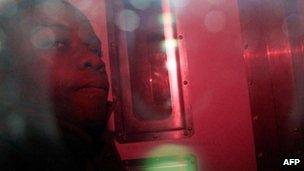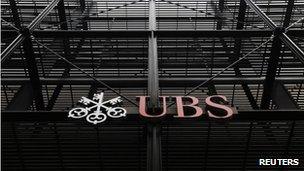UBS trader: What next for the bank after Adoboli conviction?
- Published

Adoboli was jailed for seven years after being found guilty of fraud
Officials at UBS this week breathed a sigh of relief after their former trader Kweku Adoboli was convicted of fraudulently gambling away $2.3bn (£1.4bn) of the bank's money.
But the case, the biggest fraud in UK history, is not quite over yet for the Swiss bank.
While the trial took place, financial regulators in London and Switzerland had to suspend their investigation into how the bank allowed one of its star traders to get away for so long with unauthorised trading.
Now that the case against Mr Adoboli is over, those investigators have resumed their inquiry, a spokesman at the UK's Financial Services Authority (FSA) said.
That could lead to public censure and a multi-million pound fine for the bank.
Who knew?
An important allegation that emerged from the trial is that keeping trading positions off balance sheet, in other words conducting unauthorised trades in order to boost performance on a trading desk, may not have been so uncommon at UBS.
Emma Simpson examines how former UBS trader Kweku Adoboli lost £1.4bn of his bank's money
Throughout the 10-week trial that was a key part of Mr Adoboli's defence: He claimed that others in the bank knew what he was doing and either turned a blind eye or gave a nod and a wink, encouraging him to take on more risk than the UBS rule book allowed.
It is an allegation that raises questions about the trading culture at the bank and about its compliance procedures - the checks the bank puts in place to ensure employees are not breaking trading rules.
Those are the questions financial regulators in London and Switzerland were pursuing when they launched their investigation into the affair in February this year. That investigation is said now to be drawing to a close, but even if UBS decides to settle, it could take months before a final agreement is reached.
Over the limit

UBS was brought to the brink of collapse, prosecutors claimed
Mr Adoboli admitted in court that he had been falsifying trades since as far back as 2008. It also emerged in court that UBS's systems failed to detect that Mr Adoboli's book at one stage put the bank's risk exposure at almost $12bn, something which the prosecution said could have brought down the bank.
During the trial, it emerged that the director responsible for supervising the trading desk on which Mr Adoboli worked had not completed supervisory training despite being asked to do so 17 times by UBS's compliance department.
It also emerged that Mr Adoboli's trading desk had on several occasions visibly exceeded UBS's own trading limits, which were set at $50m overnight and $100m during the day.
When Mr Adoboli made a $6m profit for the desk after breaking his risk limit, he was sent a congratulatory message by his supervisor. Only after that was Mr Adoboli chastised by the same supervisor for breaching risk limits with that same trade.
The defence team described this as the bank's "double standards": "If you make money you're in the team. If you lose money, they'll disown you," Charles Sherrard, Mr Adoboli's lawyer, said in court.
Profit motive?
Thirty-two-year-old Mr Adoboli, who joined UBS after graduating from university in the UK, had pleaded not guilty to two charges of fraud by abuse of position and four of false accounting covering the period from October 2008 to his arrest on September 15, 2011.
The jury returned a unanimous verdict of guilty on the main fraud count, holding him directly responsible for the $2.3bn loss. That count related to unhedged, multi-billion-dollar trades in the summer of 2011 that led to the losses.
They also found him guilty by a majority of 9-1 on the other count of fraud, which covered the period from October 2008 to May 2011 during which no losses were alleged.
The jury returned a not guilty verdict on the four separate charges of false accounting. To convict him of those charges, they needed to be certain that his primary motive had been personal financial gain.
Mr Adoboli had always disputed the prosecution argument that he was driven by a desire for a bigger bonus, presenting himself in court as a committed UBS employee whose motivation had always been to do his best for a bank which he described as his family.
He was given a seven-year jail sentence earlier this week.
A UBS spokesman said it had no comment on the ongoing investigation by UK and Swiss financial regulators.
- Published20 November 2012
- Published20 November 2012
- Published20 November 2012
- Published20 November 2012